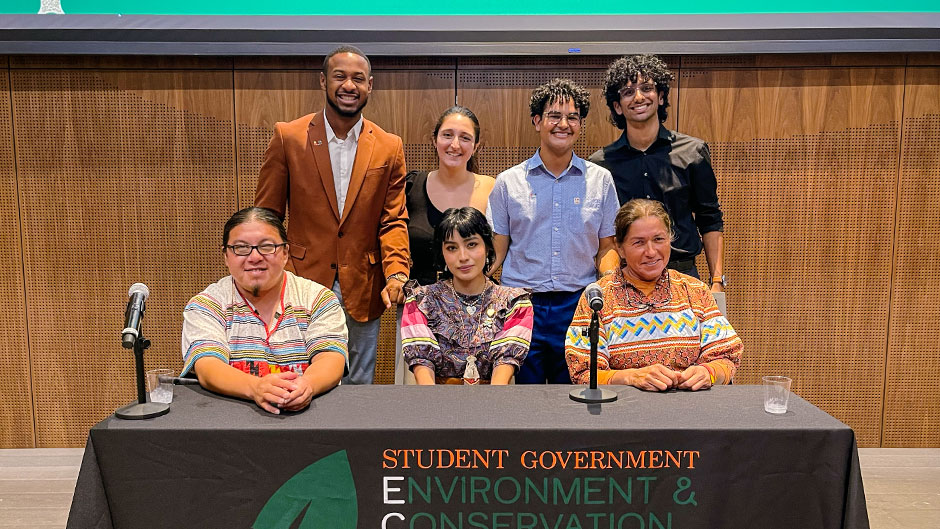To kick off the University’s Earth Month celebration, the Student Government Environment and Conservation Organization (ECO) turned to three members of South Florida’s Indigenous communities, inviting them to the Coral Gables Campus to discuss how their culture informs their environmental advocacy.
Serving on the panel at Indigenous Voices in Climate Action were Betty Osceola, a member of the Panther Clan of the Miccosukee Tribe of Indians of Florida who lives in Big Cypress National Preserve, runs an airboat company, and hosts prayer walks and educational events; Rev. Houston Cypress, a member of the Otter Clan of the Miccosukee Tribe, a poet, artist, and co-founder of Love the Everglades Movement; and Dante Blais-Billie, a member of the Seminole Tribe of Florida, an artist, and an art historian.
Student Government President Landon Coles, who moderated the event on Wednesday at the Lakeside Village Auditorium, opened the discussion by asking Blais-Billie and Cypress about their two-spirit identity, which refers to gender identities and societal roles that exist outside the Western binary of gender, and how it influences their approach to activism.
“Two spirit is a contemporary term deliberately chosen in English to be mutually understandable across Indigenous nations,” Blais-Billie said. “A lot of the knowledge that has been lost about two-spirit people parallels the knowledge lost about ecological stewardship. Two-spirit bodies are made vulnerable by colonization, just as land and water are made vulnerable. Two-spirit people are created with a unique perspective for a reason, so that helps us in many different aspects of life, whether it be in creative spaces or in walking between the worlds of human relatives and non-human relatives.”
When Coles asked Cypress to name his greatest environmental concern, Cypress stated “water quality.” Through the Love the Everglades Movement, Cypress conducts educational workshops, organizes nature hikes and airboat rides, and hosts artistic platforms to raise awareness about threats to water quality in the Everglades—including pollution from agricultural runoff, water flow disruption, and oil drilling.
“Indigenous rights are everyone’s rights,” Cypress said, noting the Everglades has been home to Indigenous tribes for many generations but that quality of life for all South Florida residents hinges on the health of this fragile ecosystem. He encouraged the students and faculty and staff members in attendance to occupy unfamiliar spaces, introduce friends to other friends, and extend the conversation into as many facets of society as possible.
For Osceola, the notion that “everyone has a purpose,” a driving principle in Indigenous cultures, helps her encourage others to explore their own roots. She believes “we all stem from the same seed” and that our ancestry holds the knowledge that will help heal the Earth. Each tribe around the world is like a puzzle piece, she said, and all pieces are required for completion of the picture.
Recognition that Indigenous people play a significant role in climate action is growing. According to a recent study cited by the Indigenous Environmental Network, efforts by Indigenous people during the past decade have blocked an amount of global greenhouse gas pollution equivalent to 25 percent of the annual emissions from the United States and Canada.
Matt Ellis-Ramirez, a junior majoring in marine affairs and ecosystem science and policy, was drawn to the event for the opportunity to hear directly from local Indigenous leaders—and how their stories intersect with his work and environmental advocacy. “Students like me who are passionate about being a substantive part of the fight against the climate crisis have much to learn from the Indigenous communities around us, and this was a great introduction to that work,” he said.
Blais-Billie appreciates inclusion of Indigenous voices in environmental work but wants to be sure they are embedded in the whole conversation.
“A lot of times, organizations will come to us after 80 percent of the work is already done, asking for our input just so they can check a box,” Blais-Billie said. “We need to be engaged from the very beginning.”
Cypress highlighted the great work of Miccosukee scientists to monitor and manage water in the Everglades. Their expertise is critical for Everglades restoration to be effective. Osceola urged attendees to learn about decisions being made by local and federal governments. When governments pass legislation that permits farms to be zoned for development, for example, they are directly affecting residents’ access to food.
Food sovereignty, the ability to have agency over what you eat, was one of the topics raised during the question-and-answer portion of the event. The panelists noted that community gardens will be necessary to offset food insecurity, which is likely to increase because of climate change, particularly as the rising seas displace coastal communities and drive development inland. They recommended becoming involved with groups like the Urban Paradise Guild, which works to restore natural habitats and build community gardens in South Florida.
When an audience member asked the panelists how they remain steadfast in their mission to protect the Earth, Osceola said she continues to talk to people because she never knows when her message will make a difference. She recalled one woman who pulled her aside on an airboat tour and said, “What do you want me to tell the president?” The woman, whom Osceola thought “was just somebody’s grandma,” worked for the Barack Obama administration.
For Blais-Bille, motivation to be an activist comes from the Earth itself.
“My ancestors have told me that every tree breathes for me,” Blais-Billie said. “So, I always think about that, and then I think about every plankton in the ocean and remember they breathe for me, too.”

